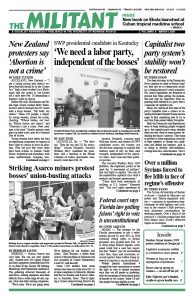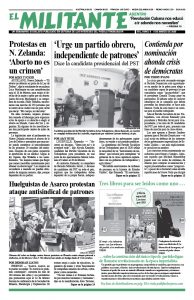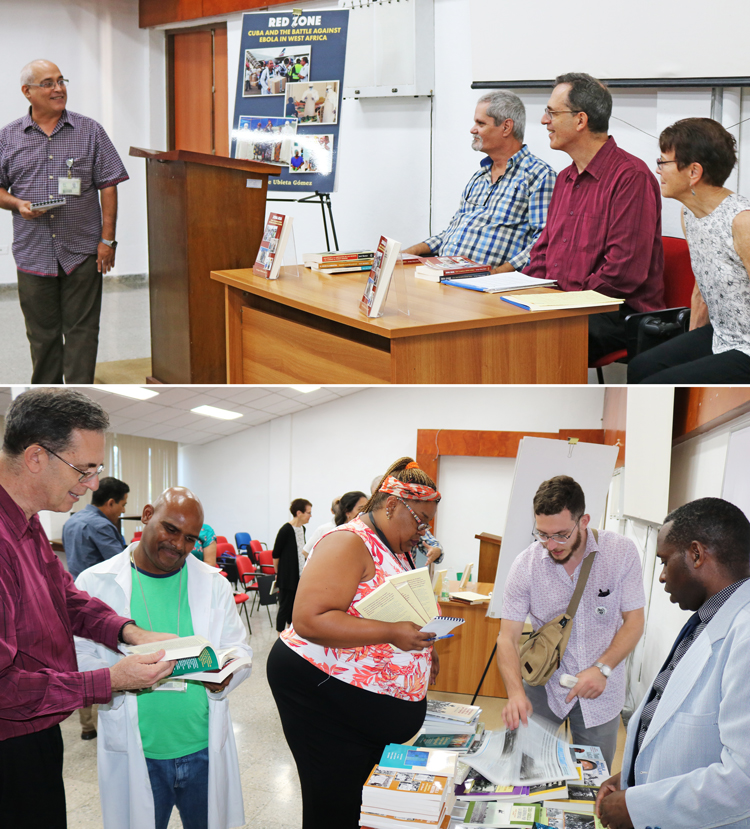HAVANA — Red Zone: Cuba and the Battle Against Ebola in West Africa, by Cuban writer Enrique Ubieta, published by Pathfinder Press in both English and Spanish, was presented Feb. 18 at the Pedro Kourí Institute of Tropical Medicine here.
The Kourí Institute is the world-renowned research center and hospital where 256 Cuban volunteer doctors and nurses — who were instrumental in ending the deadly Ebola epidemic — underwent rigorous training before going to Sierra Leone, Liberia and Guinea in 2014. It is also where Ubieta and his two-person TV film crew spent their 21-day quarantine on returning from a reporting trip to those countries, gathering the material that was used in the book.
Dr. Manuel Romero, the institute’s director, said Red Zone “counters the U.S. disinformation campaign against our internationalist doctors. It tells of the example of our ‘army in white coats’” around the world.
The invited speakers were Ubieta and Pathfinder president Mary-Alice Waters and Martín Koppel, the co-editors of the Pathfinder book. Defending Cuba’s socialist revolution and its working-class internationalism “is a necessity for us,” Waters, a leader of the U.S. Socialist Workers Party, told the meeting. “It’s inseparable from helping working people in the United States to learn from and prepare to emulate your example.”
After the program many of the 30 medical researchers and workers attending the meeting crowded around the book table to get their copy of Red Zone, as well as other books on revolutionary working-class politics. Some of them had been part of Cuba’s internationalist medical missions in Africa and elsewhere.
Proud of how they won Ebola battle
As they browsed through the books, several workers at the institute were eager to tell Militant reporters about their participation in the intensive effort to train the Ebola brigade. They noted that the Cuban personnel arrived in West Africa much better prepared than other groups of foreign doctors — and shared their knowledge with those colleagues.
They set up tents at the Kourí Institute simulating the Ebola treatment centers for brigade members to practice safety procedures. They learned how to put on and remove the specialized protective gear, and how to enter and exit the “red zone” — where the sickest patients were housed — and other wards to prevent the spread of the virus. They worked in those “space suits” under the hot Cuban sun to prepare for the conditions they would face in Africa.
Most international doctors, following World Health Organization guidelines, worked in the Ebola clinics for stints of no more than four weeks to avoid burnout. However, the highly prepared and motivated Cuban volunteers decided to stay for six months to maximize use of their cumulative experience.
Marta Castro Peraza, who helped supervise the training program for the Ebola brigade, told the Militant that medical personnel from France, United Kingdom and other countries had a policy of avoiding hands-on contact with those sick with Ebola. “But we couldn’t do that. In Cuba we’re accustomed to touching our patients,” she said.
And that’s what they did in the Ebola clinics — providing intravenous drips for rehydration, bathing and dressing patients, and assisting them with drinking and eating, without violating any safety procedures. They treated patients as fellow human beings, winning their confidence and that of their families.
The Cubans’ approach sharply lowered fatality rates. By mid-2015 the outbreak was virtually eradicated.


